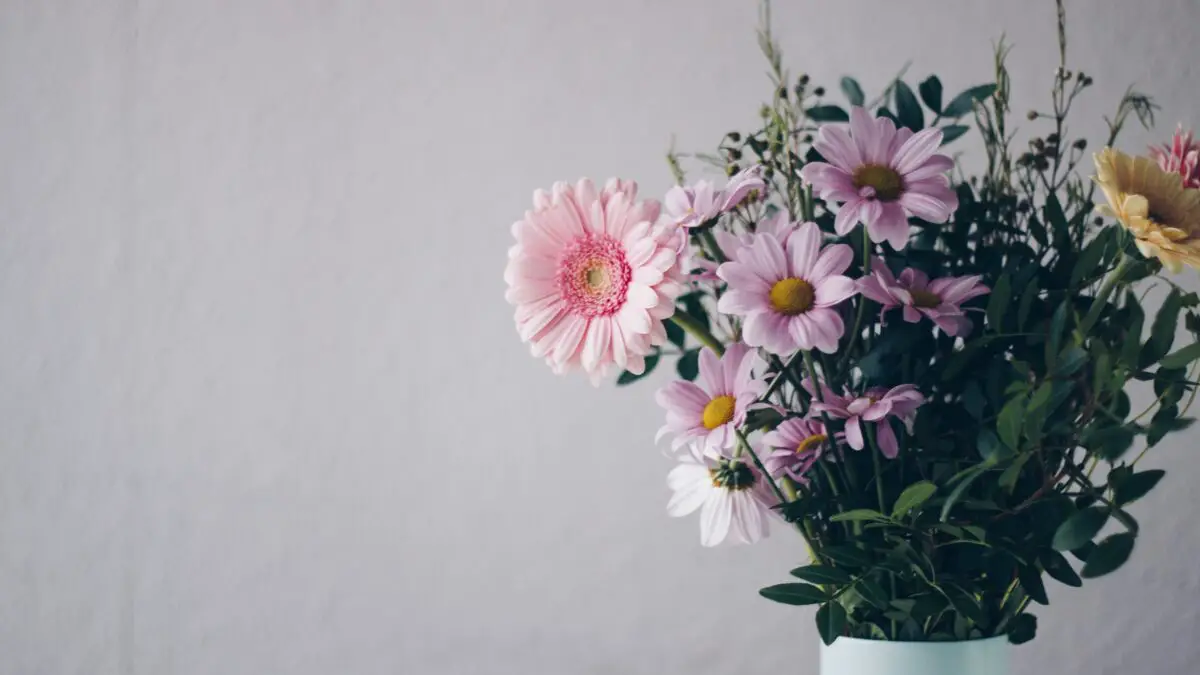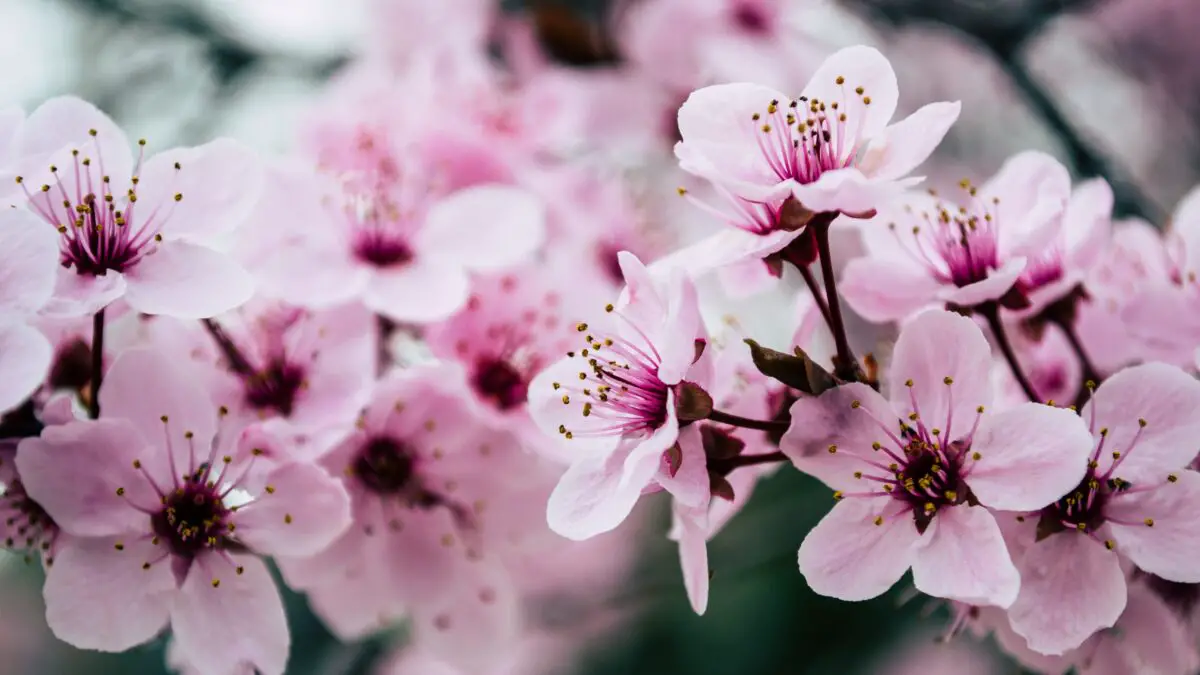Flower idioms have blossomed in the English language, filling our conversations with expressions rooted in nature’s beauty.
Just as flowers captivate the senses, these idiomatic expressions enliven our speech, but they can be confusing if you don’t know exactly what they mean. That’s why we have included a helpful definition and example sentence with each of the flower idioms in this list.

Flower idioms
A bed of roses
The first of our flower idioms refers to a state of comfort or luxury. A bed of roses is a situation that is pleasant and without difficulties or challenges.
“Don’t be fooled by appearances; running a business is not always a bed of roses.”
This rose idiom is very often used in a negative sense, as in the example above, to say that a difficult or challenging situation is not a bed of roses.
You may also recognize the phrase from this 1993 Bon Jovi hit.
In full bloom
When a tree or plant has fully flowering blossoms, you could say it is in full bloom. However, you can also use this saying in a more figurative sense to describe something at its peak of development, achievement, or success.
“Her career is in full bloom; she’s achieved everything she set out to do.”
Coming up roses
Coming up roses describes a situation or outcome that is turning out positively or favorably. It can also mean that everything is going smoothly and as planned.
“It actually went better than I expected! I was worried, but it seems like my hard work paid off. Everything is coming up roses!”
Fresh as a daisy
When you’re feeling energetic and well-rested, you could say you’re fresh as a daisy. This saying can also be used to describe someone who appears lively, invigorated, and ready to take on new challenges.
“Despite the long journey, she woke up feeling fresh as a daisy.”
This phrase would be great to use as a health idiom or to describe how you’re feeling.
Stop and smell the roses
You may notice that this list features a lot of rose idioms, and here’s another. To stop and smell the roses is to pause and take the time to enjoy or appreciate the present moment.
“Life moves fast, so it’s important to stop and smell the roses along the way.”
You may hear just smell the roses, with a similar meaning of appreciating the beauty of what is going on around you rather than letting life rush by.
Rose-colored glasses
People who see things in an optimistic light could be described as seeing things with rose-colored glasses or spectacles. This saying suggests they perceive situations or people with an unrealistic and overly positive viewpoint.
“She always wears her rose-colored glasses, even in the face of adversity.”
“I realize now that I was wearing rose-tinted glasses through the whole relationship.”
Rose-tinted glasses is a common variation of this positive idiom.
Flower power
Flower power refers to the cultural and political movement of the 1960s that advocated for peace, love, and equality in a non-violent way.
“I loved the flower power era. We changed things without hurting anyone.”
Someone who was part of this movement could be called a hippy or a flower child.
Wallflower
The term wallflower is used for shy or socially awkward people who tend to stay in the background at social events.
“At parties, John tends to be a wallflower, preferring to observe rather than participate.”
There are more party idioms to describe other types of people.
Budding artist
A ‘bud’ is an undeveloped flower, leaf, or shoot on a plant. Likewise, a budding artist is a promising or talented individual in the early stages of their artistic development. It describes someone who shows great potential and talent in their chosen art form.
“This young pianist is a budding artist; her talent is undeniable.”
This expression is not limited to artists; you could equally describe someone as a budding musician, budding chef, etc.
Withering away
Fresh flowers are beautiful when in full bloom, but over time they start to wither. In the same way, withering away refers to gradually losing strength, vitality, or importance.
It can be used as an idiom for death, or just to describe something or someone in a state of decline or deterioration.
“Without proper care, their friendship started withering away over time.”
“My grandfather started withering away as soon as my grandmother died.”
A thorn in your side
Thorns on flowers are not pleasant if they catch or cut you. So, a thorn in your side is someone or something that persistently causes trouble, irritation, or difficulty.
“Lara has been a thorn in my side since the day she started working here.”
Did you know this is an idiom from the Bible?
Petal-soft or as soft as a petal
Most people can agree that a flower petal is soft, beautiful, and fragile. Therefore, a great way to highlight something as extremely gentle or delicate is to call it petal-soft or as soft as a petal.
“The fabric of her dress was as soft as a petal, caressing her skin with each movement.”

Idioms about flowers
Branch out
When you branch out you expand your interests, business opportunities, or activities. You explore new areas or venture onto different paths beyond your comfort zone.
“I think it’s time for us to branch out and start our own business.”
You may also hear different buildings or shops of the same company referred to as ‘branches’.
Like a weed
Some people say that a weed is just a flower growing where you do not want it. For most people, though, a weed is something annoying and difficult to get rid of.
When you describe something or someone as like a weed, you are saying that they are growing, appearing, or spreading rapidly and often undesirably.
“Gossip spreads like a weed, infiltrating every corner of the office.”
Flowery language
If you speak eloquently and use poetic expressions, it could be said you have flowery language. This expression refers to embellished and expressive language, often associated with literary or artistic works.
“His speeches were always filled with flowery language, captivating the audience.”
In the doldrums
If you’re feeling low, sad, or lethargic, you could be said to be in the doldrums. This could also refer to boredom or lack of motivation.
“After a long work week, I find myself in the doldrums, needing a break.”
Plant seeds
When you lay the groundwork, suggest an idea, or initiate a process, you plant seeds. This means to prepare the way for future development or growth.
“She knew that networking events were an opportunity to plant seeds for future collaborations.”
Discover some more nature idioms here – there are so many ways we use the natural world in figurative expressions!
Fertile ground
Fertile ground is a popular flower saying that’s used in many situations. It describes a favorable environment or situation for growth or development. As a business idiom, it refers to a context that is conducive to success and productivity.
“The city’s vibrant cultural scene provides fertile ground for aspiring artists.”
You may also hear fertile soil, meaning the same thing.
Oops-a-Dasiy
Oops-a-daisy is an informal flower saying that is typically used in a playful or comforting manner when someone falls over or is being lifted or helped up. It’s especially common to say this when a child has tripped or stumbled.
“Oops-a-daisy! Let me help you up, sweetie.”
Bloom where you’re planted
People who bloom where they’re planted thrive or succeed in the circumstances they find themselves in. They are people who make the most of their current situation, finding opportunities for growth and fulfillment.
“Instead of complaining about the situation, she decided to bloom where she was planted.”
This is one of many idioms for success in English.
A thorn between two roses
Here are two flower idioms not to be confused.
A thorn between two roses describes a person, typically male, who finds themselves in a situation where they are surrounded by two attractive or desirable individuals, usually women.
It can also imply that the person is caught between two conflicting choices or dilemmas.
“I feel like a thorn between two roses. I genuinely care about Sarah and Emily, but I don’t want to ruin our friendships or make either of them feel rejected.”
“I look like a thorn between two roses in that photo!”
Every rose has its thorn
Another thorn-related rose idiom is every rose has its thorn.
This is a popular way to emphasize that even beautiful or positive things can have their drawbacks or flaws. It suggests that nothing is perfect and that even the most pleasant or appealing things may have negative aspects.
“Well, every rose has its thorn. I love this apartment, but the lack of soundproofing is definitely a downside.”
A rose by any other name (would smell as sweet)
This famous saying is taken directly from William Shakespeare’s play Romeo and Juliet. It is spoken by Juliet in reference to the fact that the name of something does not change its inherent nature or qualities.
The phrase a rose by any other name would smell as sweet is often shortened to just a rose by any other name or rephrased to a rose by any other name is still a rose.
“I don’t care whether you change your name when we get married. A rose by any other name is still a rose.”
April showers bring May flowers
Perhaps one of the older flower idioms in English, April showers bring May flowers highlights the idea that difficult or unpleasant times can lead to positive outcomes in the future.
It reminds us that the rain in April, often associated with gloomy weather, is necessary for the blooming of flowers in May.
“April showers bring May flowers. All the effort I put in during the difficult phases has paid off, and now I can see the fruits of my labor.”
There are plenty of other spring idioms to explore.
Pushing up (the) daisies
Here’s another flower idiom that refers to dying, although this is often used in a light-hearted, joking way. If someone is pushing up (the) daisies it means they are dead and buried.
“If I don’t finish this report soon, my boss will have me pushing up daisies!”
You can see an example of this phrase used in a classic British comedy sketch by Monty Python:
Nip it in the bud
The second of our bud-related flower idioms means to take action and address a problem or issue at an early stage, before it becomes more significant or challenging to handle. Nipping something in the bud is an important thing to do.
“I think we have to nip his behaviour in the bud before it gets out of hand.”
The language of flowers in English is fun to explore, with all these vivid flower idioms that add color and depth to our everyday conversations. Can you think of any other flower sayings that should be on this list? Leave a comment below to let us know!


